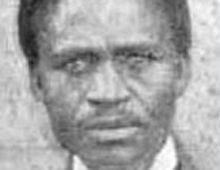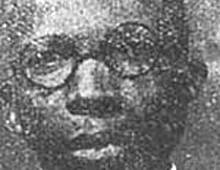Thapelo Mokoatsi
October 6 marks the centenary of Saul Msane’s passing whose death coincided with the end of his political career in the then Transvaal where his ANC colleagues labelled him isitha sabantu (enemy of the people). In his hometown, however, he is a hero.
I was recently invited by the Edendale Project – a consortium concerned with accurately recording Edendale’s history – to present one of my PhD thesis chapters to its community members gathered at the local Georgetown Library. It had been a journey since I was introduced to their struggle hero – an intellectual, newspaperman and political activist – and a keen chess player – Saul ‘Mayimayi’ Msane.
I was 19 in first year undergraduate school at the University of the Free State (UFS) in 2008, a year after Jacob Zuma rose to power at the Polokwane conference, amidst much controversy. Mosiuoa Lekota was one of those who went off to form and launch a break away opposition party Congress of the People (COPE). All roads led to UFS’s South Campus to hear Zuma’s condemnation of the breakaway party at an ANC-led meeting.
I hopped on the bus transporting students from the main campus to the south campus, and was met with a very impressive banner spread across the main gate of five African men impressively dressed in three piece suits – Sol Plaatje, Walter Rubusana, Saul Msane, John Dube and Thomas Mapikela. This image remains indelible in my mind.
Six years later, in 2014, I penned my first article on one of these gentlemen, Walter Rubusana. Little did I know that that was the beginning of a journey that would lead me to writing about the pioneers. My research on Saul Msane eventually led to me becoming his biographer.
Coming full circle
There I was in 2019, standing atop the local heritage site, World’s View, which lies at the edge of the world along a road also called World’s View, in Pietermaritzburg. From up there, one experiences breathtaking views of Table Mountain (not the one in Cape Town), eMkhambathini, and the surrounding countryside. On a clear day, some say, you can see as far as Durban. A forest of Bluegum trees surrounding the rolling hills, blocked part of my view of Msane’s birthplace but they provided clean and fresh air for one’s creative perspective. On the foot of the hill is the N3 highway going all the way to Durban. This experience was serendipitous.
Gracia Nokwe of the Edendale Project, who received me and chaperoned me throughout my stay observed that I was standing on top of the entire map carved on the floor of the hill, it showed the movement and presence of the Voortrekkers in Natal. “This is Welverdient. Now called Edendale,” she pointed out.
I instantly remembered that after the Ncome River battle in 1838 between the Afrikaners and the Zulus, Andries Pretorius aka Potolozi, a Voortrekker leader, was thanked for his contribution in the war. He was rewarded with the Welverdient farm, which means ‘well deserved’ in Dutch. When in 1851, Potolozi sold his 6123 acres of land to Reverend James Allison and missionaries, it was named Edendale.
Saul Msane’s father, Matthews ‘Matiyose’ became one of the first group of Zulus to be converted to Christianity by Allison and owned land in Edendale where Mayimayi would be born in 1856. The birthplace of Msane is as complex as his life’s twists.
Connecting with stalwarts in Georgetown
Our next stop was Nuttall College which was still in good shape, and to attest to that was Hitler Mbambo who had matriculated in the 1960s in Kilnerton, one of the Wesleyan schools, in Pretoria. He told us that today the original building of Kilnerton is ruined. But not Nuttall College. Its original building was renovated by Sanlam not so long ago. Mayimayi had taught at Nuttall College. He had joined the world of pedagogues in 1882 when he completed a Teachers’ Certificate in Healdtown, and taught at Driefontein, now Ladysmith, until 1892 when he joined the Zulu Choir before moving to Nuttall. In both teaching spells he was under the tutelage of Reverend Ezra Nuttall who first arrived in Natal in 1875. His missionary work covered Mdlhoti, Ndaleni (Richmond) and Driefontein. The school was named in his honour but is now known as Edendale Primary School.
In 1918, Msane opposed a strike action plan organised by the ANC, in which mineworkers were demanding higher wages. He believed that a settlement could be reached through negotiation with the white mine owners. He did not attend the strike planning meeting of the ANC. As a result, Abantu Batho called him isitha sabantu or enemy of the people.
However, after his sudden death in October 1919, both the ANC and Abantu-Batho paid tribute to him for his various contributions.
One of the biggest highlights of my trip to Edendale this time round, was visiting the grave of Selby Msimang who was also one of the founders of the ANC in 1912 and meeting his daughter, grandson and biographer, Sibongiseni Mkhize.
Another close friend and colleague of Mayimayi whose beautiful house is still standing to date in Pietermaritzburg is Josiah Tshangana Gumede. He joined Mayimayi in 1892 as part of the Zulu Choir in London and later became ANC president from 1927 to 1930. He taught at Adams College and Nuttall College before joining the Zulu Choir with MayiMayi.
Where cosmic points meet
The centenary of the death of Saul Msane is a celebration of mfo kaMatiyose being joined with his entire clan and for mere mortals like myself we must be grateful that Msane’s ancestors blessed us with his presence and impact on earth for 63 years. It has been an honour to be chosen by the Afrikan gods to write Mayimayi back into the popular memory.
—-
Clan’s praise
Msane!
Majoka!
Mthantathwa!
Nxaba kaMbhekane owabhekana nokuhlupheka,
Mgobozi owehl’ entabeni
Vangise!
Kunene!
Ntetha!
Nonjongo!
Khwila!
Zashula!
Madl’ isibindi sengonyama abanye bedl’ esenkomo,
Lombo kaLokothayo ongalokothwa,
Delela, Mvune owavuna kuqala abanye bengakavuni,
Joka lensimbi elingaphuki abanye bebophela ngwawokhuni,
Mtimande!
Vundla!
Madisa!
Mageza ngobisi abanye begeza ngamanzi.










